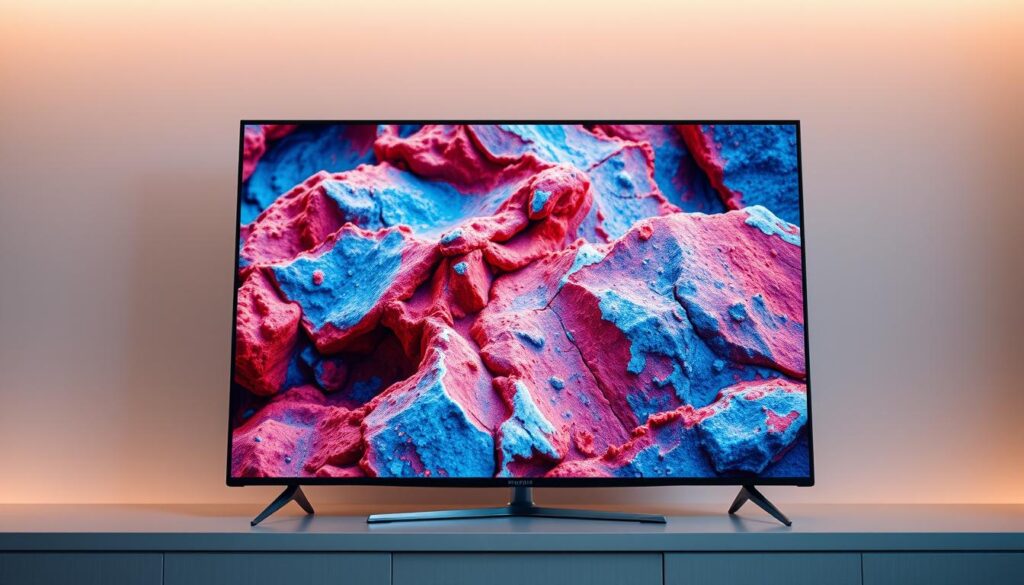Streaming in 4K Ultra HD gives you amazing picture quality. But, it needs a fast and stable internet connection. To stream 4K smoothly, knowing the bandwidth needs is key. A download speed of 25 Mbps is the minimum for 4K streaming.
For uninterrupted streaming, aim for 40-60 Mbps. If you want the best IPTV for 4K, look for services that offer high-quality UHD streaming without buffering.

A futuristic and minimalist scene depicting the essence of 4K streaming bandwidth. Centered is a sleek, high-tech router or modem bathed in a soft, ambient glow. The background showcases a serene cityscape with skyscrapers and modern architecture, representing the infrastructure that enables seamless 4K content delivery. Subtle rays of light emanate from the device, symbolizing the high-speed data transmission. The overall mood is one of technological advancement, efficiency, and the reliable power of 4K streaming bandwidth.
Key Takeaways
- Minimum Speed for 4K Streaming: 25 Mbps
- Recommended Speed for Uninterrupted 4K Streaming: 40-60 Mbps
- Choosing the Best IPTV: FantasticIPTV.com provides high-quality UHD content
- Internet Speed’s Role in Streaming: The faster the connection, the better the video quality
- Optimizing Home Network: Using wired connections and high-quality routers can improve 4K streaming
Finding the right balance between speed and quality is key for 4K streaming bandwidth. By knowing how much speed you need and choosing the best IPTV for 4K, you can enjoy a seamless and high-quality viewing experience.
Understanding 4K Streaming Resolution
Streaming quality is key for a great viewing experience. You might wonder about 4K and HD. The main difference is in resolution. 4K has a much higher pixel density than HD, making it more detailed and immersive.
HomeLinkd says 4K is four times more detailed than Full HD (FHD). FHD is 1920 x 1080p, while 4K is 3840 x 2160p. This means 4K offers a clearer picture.
The visual benefits of 4k are many. With higher resolution, you get a more engaging and detailed experience. Watching movies or TV shows with complex scenes is much better in 4K than HD.
The 4k vs hd debate shows 4K is better for viewing. To stream in 4K, you need at least 25 Mbps bandwidth. This is more than HD streaming needs.
Here are some key points about 4K streaming resolution:
- Minimum bandwidth required for 4K streaming: 25 Mbps
- Minimum Internet speed recommended for 4K video quality: 25 Mbps
- 4K resolution is four times the detail of standard Full HD (FHD) resolution
A detailed 4K display with vivid colors and clarity, showcasing the high-resolution capabilities of modern streaming. The screen is set against a sleek, minimalist background, with a soft, warm lighting that accentuates the image’s depth and clarity. The display features a crisp, detailed image with vibrant hues and subtle textures, reflecting the high bitrate and superior image quality of 4K streaming. The scene conveys a sense of technological sophistication and the immersive viewing experience that 4K resolution can provide.
In conclusion, knowing the difference between 4K and HD is crucial for a top-notch streaming experience. The visual benefits of 4k are clear, and with the right bandwidth, you’ll enjoy a more immersive experience. Whether it’s movies or TV shows, 4K streaming is the best choice.
4K Streaming Bandwidth Requirements
To enjoy seamless 4K streaming, your internet connection must meet certain requirements. The minimum internet speed for 4K streaming is 25 Mbps, as Netflix and Tom’s Guide suggest. But, the needed speed can change based on the streaming service.
For example, Disney+ says you need 25 Mbps for 4K streaming. YouTube recommends a minimum download speed of 20 Mbps for 4K videos.
Here are some general guidelines for 4K streaming bandwidth requirements:
- Netflix: 25 Mbps for 4K Ultra HD content
- Disney+: 25 Mbps for 4K streaming
- YouTube: 20 Mbps for 4K videos
- Amazon Prime Video: 15 Mbps (inferred based on Netflix’s requirements)
Keep in mind, these speeds are just general guidelines. Your actual internet speed can differ. Things like how many devices are connected, network congestion, and WiFi signal strength can affect your streaming.
To have a smooth 4K streaming experience, aim for a download speed of 50 Mbps or higher.
A futuristic data center with towering server racks, glowing blue cables, and a central server hub. The room is bathed in a cool, blue-tinted lighting, giving it a high-tech, scientific atmosphere. Intricate circuitry and abstract 3D data visualizations float in the air, representing the massive bandwidth and processing power required for 4K video streaming. The scene conveys the scale, complexity, and technological sophistication needed to deliver ultra-high-definition video content to homes and devices.
Knowing the 4K streaming bandwidth requirements for your favorite services helps ensure a great viewing experience. Always check your internet speed and adjust your streaming settings to get the best 4K streaming experience.
The Impact of Internet Speed on Streaming Quality
Internet speed is key for a good streaming experience. A fast internet means you get buffer-free playback and high-quality streams. But, slow speeds can cause choppy videos and lower quality.
HomeLinkd says you need at least 25 Mbps for Ultra-High Definition (4K) streaming. This shows how important speed is for quality.
To get the best streaming, think about your internet speed for streaming. A faster connection means better quality scaling. This makes your viewing more immersive and fun. Here are some important points:
- Minimum internet speed required for Standard Definition (SD) streaming: 3 Mbps
- Minimum internet speed recommended for High Definition (HD) streaming: 5-10 Mbps
- Minimum internet speed required for Ultra-High Definition (4K) streaming: 25 Mbps
In short, internet speed greatly affects streaming quality. Knowing how internet speed for streaming works with buffer-free playback and quality scaling helps you choose the right internet plan. This way, you can enjoy top-notch streaming.

Understanding 4K Streaming Resolution
The main difference between 4K and HD lies in pixel density. 4K resolution (3840 x 2160p) offers four times the detail of Full HD (FHD) (1920 x 1080p). This leads to richer details, better color accuracy, and an immersive viewing experience.
4K vs. HD Streaming:
| Feature | HD (1080p) | 4K UHD (2160p) |
|---|---|---|
| Resolution | 1920 x 1080 | 3840 x 2160 |
| Detail Level | Moderate | High |
| Bandwidth Need | 5-10 Mbps | 25+ Mbps |
| Best For | General streaming | High-quality viewing, sports, movies |
4K Streaming Bandwidth Requirements
Each streaming platform has different bandwidth needs:
| Platform | Minimum Speed Required |
|---|---|
| Netflix | 25 Mbps for 4K Ultra HD |
| Disney+ | 25 Mbps for 4K streaming |
| YouTube | 20 Mbps for 4K videos |
| Amazon Prime Video | 15-25 Mbps (estimated) |
| Hulu | 16 Mbps for 4K |
For smooth playback, a download speed of 50 Mbps or more is recommended.
Why IPTV Demands Higher Bandwidth
Unlike on-demand streaming, IPTV streams live content, requiring a consistent connection. FantasticIPTV.com ensures seamless IPTV streaming with high-speed UHD content.
IPTV Bandwidth Requirements:
| Streaming Quality | Minimum Speed Required |
|---|---|
| SD (Standard Definition) | 3-5 Mbps |
| HD (High Definition) | 5-10 Mbps |
| 4K Ultra HD IPTV | 25 Mbps or more |
Optimizing Your Home Network for 4K Streaming
To avoid buffering, follow these steps:
Choose an IPTV service with optimized streaming, like FantasticIPTV.com.
Use a wired Ethernet connection for more stable speeds.
Upgrade your router to support high-speed streaming.
Reduce network congestion by limiting devices using bandwidth simultaneously.
Measuring Your Current Internet Speed
To see if your internet speed is good for 4K streaming, you need to check it. You can use online tools or apps for an internet speed test. These tools show your download and upload speeds, which matter for streaming high-quality videos.
Studies say the average American household pays $61 a month for internet. They recommend speeds from 25 Mbps to 200 Mbps, based on how many devices you have and how much you use the internet. For example, Netflix says you need at least 5 Mbps for HD streaming and 25 Mbps for 4K Ultra HD.
Here are some tips for measuring internet speed:
- Check your internet service provider’s recommended speeds for your plan
- Use online speed test tools to measure your download and upload speeds
- Compare your results with the recommended speeds for your devices and usage
By following these steps, you can find out if your internet speed is good for 4K streaming. You can then make changes to get a better viewing experience.
| Number of Devices | Recommended Download Speed |
|---|---|
| 1-2 devices | Up to 25 Mbps |
| 3-5 devices | 50-100 Mbps |
| More than 5 devices | 150-200 Mbps |
Common Streaming Issues and Their Solutions
Streaming can be hit or miss, especially with buffering problems and connection stability issues. These streaming issues often stem from not enough bandwidth and too much network traffic. To fix these, you need to boost your internet speed and pick a trustworthy streaming service.
Here are some ways to tackle streaming issues:
- Make sure your internet speed is up to par for your streaming service
- Switch to a wired connection to cut down on buffering and lag
- Turn off other apps or devices that might be hogging bandwidth
By doing these, you can tackle buffering problems and connection stability issues. This will make your streaming smooth and enjoyable. Always check your streaming service’s speed needs to ensure you have enough bandwidth.
Optimizing Your Home Network for 4K
To get the best out of 4K streaming, you need to optimize your home network. Start by using a wired Ethernet connection for your streaming devices. This gives you a more stable and reliable connection than Wi-Fi.
If your router is old, think about getting a newer one. Look for one that supports the latest Wi-Fi standards. This will help handle the bandwidth needs of 4K content. Also, make sure your router is in a good spot, away from interference. Make sure your devices work well with your network too.
By doing these things, you can make sure your 4K streaming is smooth. Remember, you need at least 25 Mbps for 4K streaming. But for the best experience, aim for speeds of 100 Mbps or more. With the right network, you can stream 4K content without any problems, even on multiple screens at once.

Why FantasticIPTV.com is the Best for 4K IPTV
If you’re looking for the best IPTV provider for 4K, FantasticIPTV.com offers: ✅ 4K, UHD, FHD, and HD streaming
✅ Over 20,000 live channels
✅ Stable, buffer-free IPTV service
✅ Affordable plans with a money-back guarantee
With the right internet speed and FantasticIPTV.com, you can enjoy an unmatched 4K streaming experience. 🚀
FAQ
What makes 4K different from HD?
4K has four times more pixels than HD. This means it offers much clearer and more detailed images. It makes watching videos more immersive and fun.
What are the visual benefits of 4K content?
4K content has sharper images and more vibrant colors. It looks more realistic and stunning. This makes for a better viewing experience.
Why does resolution matter for streaming quality?
Resolution affects how clear and detailed streaming can be. Higher resolutions like 4K need more bandwidth. This ensures a smooth, high-quality stream.
What is the minimum internet speed needed for smooth 4K streaming?
For 4K streaming, you need at least 25Mbps internet speed. But, the exact speed needed can change based on the streaming service and content.
How does internet speed impact the streaming quality?
Internet speed is key for streaming quality. It affects how well you can watch videos without interruptions. Slow speeds can cause buffering and quality drops.
What are the platform-specific speed requirements for 4K streaming?
The speed needed for 4K streaming varies by platform. Services like Netflix and YouTube usually need about 25Mbps or more for the best quality.
Why does IPTV demand higher bandwidth?
IPTV needs more bandwidth than on-demand streaming. This is because it streams live content and manages multiple streams. It also aims to keep quality high during broadcasting.
How can I measure my current internet speed?
You can check your internet speed with online tests or apps. They show your download and upload speeds, and other important metrics.
What are some common streaming issues and how can I resolve them?
Streaming problems include buffering, quality drops, and connection issues. To fix these, check your network, optimize your router, and make sure your internet speed is enough for streaming.
How can I optimize my home network for 4K streaming?
For better 4K streaming, use Ethernet cables, update your router, and adjust your Wi-Fi settings. This ensures a smooth and reliable streaming experience.

